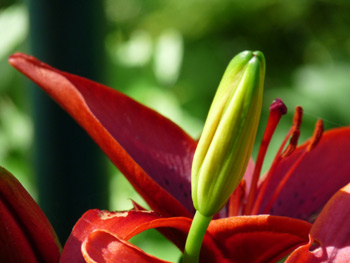"Beauty is in the eye of the beholder"
Par Iris le samedi 17 juillet 2010, 13:00 - Lien permanent
Curieux comme le "hasard' semble parfois nous conduire exactement à ce que nous cherchions implicitement - devisant hier soir sur la faculté que nous avions en vieillissant de nous enfermer dans des tours d'ivoire, des carapaces stériles faites de milliers de gestes répétitifs, d'idées toutes faites, qui nous coupent de toute possibilité de changer, d'évoluer, de vivre réellement - et nous étouffent d'un ennui qui nous lamine petit à petit jusqu'à ce qu'il ne reste plus rien qu'un grand vide désespéré et stérile -

voici ce matin que je tombe ici sur cet extrait magnifique tiré de "The Invisible Embrace of Beauty" by John O'Donohue :
The human gaze is not the closed, fixed view of a camera but is creative and constructive. Both the gaze that sees and the object that is seen construct themselves simultaneously in the one act of vision. SO much depends then on how we see things. More often than not the style of gaze determines what we see. There are many things near us that we never notice simply because of the way we see. The way we look at things has a huge influence on what becomes visible for us. If a house has been closed up for a long time, a film of dust settles on the windows. Decayed residue gradually manages to seal out the light. When we go into such a place, we smell the dankness of sour and fetid air. The same thing can happen in the rooms of the mind. If one has become stuck in a certain narrow or predictable way of seeing, the outside light cannot bring colour into one's life. Eventually the windows of the mind become blinded by an imperceptible film of dead thought and old feeling so that the air within becomes stale, life lessens and the outside world loses its invitation and challenge. When no fresh light can come into the mind, the colour and beauty fade from life. There is an uncanny symmetry between the inner and the outer world. Each person is the sole inhabitant of their own inner world; no-one else can get in there to configure how things are seen. Each of us is responsible for how we see, and how we see determines what we see. Seeing is not merely a physical act: the heart of vision is shaped by the state of the soul. When the soul is alive to beauty, we begin to see life in a fresh and vital way. The old habits of seeing are broken. The coating of dead dust falls from the windows. Freed from their dead forms the elements of one's life reveal new urgency and possibility.
We have often heard that beauty is in the eye of the beholder. This is usually taken to mean that the sense of beauty is utterly subjective; there is no accounting for taste because each person's taste is different. The statement of another, more subtle meaning: if our style of looking becomes beautiful, then beauty will become visible and shine forth for us. We will be surprised to discover beauty in unexpected places where the ungraceful eye would never linger. The graced eye can glimpse beauty anywhere, for beauty does not reserve itself for special elite moments or instances; it does not wait for perfection but is present already secretly in everything. When we beautify our gaze, the grace of hidden beauty becomes our joy and our sanctuary.
Commentaires
une traduction en français svp !!